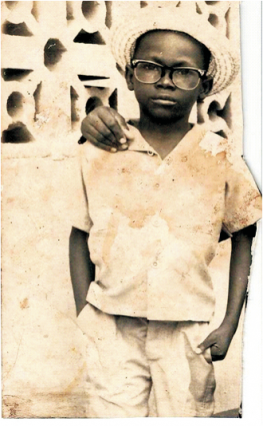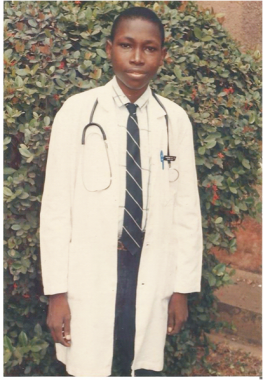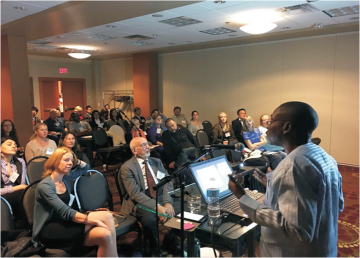Obituary | Dr Muideen Owolabi Bakare
By Kerim M. Munir, MD, DScDevelopmental Medicine CenterBoston Children’s Hospital/Harvard Medical School
Muideen Owolabi Bakare: A Rising Star in Autism and Neurodevelopmental Disabilities in Sub-Saharan Africa (1972-2023)
Muideen Owolabi Bakare, a leading figure in developmental neuropsychiatry passed away on October 9, 2023, from complications related to Sickle Cell Disease. Since our memorable meeting near Fenway Park, a decade and half earlier, we developed a close friendship and collaboration. I witnessed the truly amazing progress of his scientific and professional career. I never imagined that I will be writing about his untimely tragic loss.
To a very great extent, Muideen’s life was a miracle. He was born in 1972 at a time in Sub-Saharan Africa when there was little awareness of Sickle Cell Disease. His parents were notified of his suspected condition when he was 9 months old. They remained steadfastly close and nurturing of him throughout his illness. Although he went on to experience severe joint and bone pains with recurring hospitalizations throughout his childhood, and developed a physical disability due to avascular necrosis of his left femur that limited his mobility, it never touched his spirit and his sense of humor.
In his autobiography Aro’mo L’Eéegun (Harbinger of Bone Pains) he chronicled his life’s journey. As Professor Myron Belfer, President Emeritus of IACACAP, emphasized in the foreword of Muideen’s autobiography “he overcame obstacles that would have thwarted the dreams of most but of a person who had the gifts to always go beyond expectations.” Muideen was a brilliant student excelling in academics at school. He developed an interest in medicine inspired, rather than by being put off, by his continuing exposure to hospitals, doctors, and nurses, a tribute to the medical care he received in Nigeria. He entered medical studies at the University of Ibadan College of Medicine to help others like himself. He did not end up studying Sickle Cell Disease, although many of his subsequent studies in mental health remained highly relevant to chronic illness and disability.

Young Muideen in Ibadan in 1978
Muideen completed his medical studies graduating on time despite often taken ill. On one occasion he recalled being asked by one of the doctors why he chose to study medicine and why was he wasting funds when he knew he would soon die? Another bout of discouragement came when he tried getting an internship position at the University of Ibadan Teaching Hospital, despite being among the best graduating students. This posed a Herculean task, as there was an unwritten rule against taking Sickle Cell Disease patients serving as house officers, since it was felt it would impede their activities given the tedious and rigor of the work. There was a turnaround thanks to the influence of one of his esteemed teachers, Professor Wuraola Shokunbi, who was also the physician who took care of him during trying periods of hospitalization at medical school. She told him, “Do your best, be among the best, and I will speak for you. And she did!” She was the Chair of the Medical Advisory Committee at the University College Hospital and supported his appointment. Muideen did brilliantly.

Clinical medical student at University College Hospital, Ibadan, Nigeria in 1995
Dr. Patricia Ibeziako, a classmate at Ibadan, now an Associate Chief for Clinical Services at Boston Children’s Hospital, shared her experience 6 years after their internship year when they were together at the IACAPAP World Congress in Melbourne, Australia: “One morning during my internship back home, I had a bout of malaria and was contemplating calling in sick when I glanced out of the window to see my classmate Muideen Bakare limping to work. Muideen is another one of my personal heroes, and an uplifting example of how resilience thrives in the face of the adversities of a developing country. Living with sickle cell anemia, he not only made it through medical school and internship but was one of the first from our class to complete a residency in psychiatry. While my greatest worry about flying to Australia was jetlag, Muideen's blood count dropped to critical levels days before the conference. Still, he insisted on traveling to Melbourne to present his poster on emotional aspects of Sickle Cell Disease in adolescents — regardless of his own risk of developing a painful vaso-occlusive crisis during the long flight”.
For Muideen, his struggle against Sickle Cell Disease was like “a war you fight psychically and a war you fight in the arena of your mind.” When his hopes to enter training in hematology could not materialize, Muideen found solace in psychiatry, and subsequently in child and adolescent psychiatry, under the influence of great teachers at Ibadan, Professors Oye Gureje, and Olayinka Omigbodun, respectively. He was appointed as a Consultant at the Federal Neuro-Psychiatric Hospital in Enugu where he began to pioneer research in neurodevelopmental disorders among Sub-Saharan African children with a special focus on autism spectrum and intellectual developmental disorders. He went to lead the Child and Adolescent Psychiatry Unit in Enugu.
Muideen made the best of the opportunities presented to him, a tribute not only to his innate intelligence, but his tireless work ethic that served him well throughout his career. His work on autism was recognized by the International Society for Autism Research (INSAR) as its Nigeria ambassador. He also served as Secretary of the Scientific Section on Psychiatry of Intellectual and Developmental Disorders of the World Psychiatric Association (WPA) and participated in the Expert Review Group of the ICD-11 Classification of Intellectual Disability of the WHO in 2011. He was an Expert Consultant at the World Innovation Summit in Health (WISH) Autism Forum in 2016 in Doha that published the report on Autism: A Global Framework for Action. He served as an invaluable co-author of the autism chapter in the IACACAP e-Textbook. Two of his last publications include a collaboration with Autism Speaks on the validity and reliability of the Nigerian Autism Screening Questionnaire that he helped develop, and a joint commentary in the Lancet with other African investigators on the need to improve autism services in low resource settings.
Muideen was one of the first recipients of a Grand Challenges Canada (GCC) project grant in mental health co-sponsored by Bill and Melinda Gates Foundation on “Early Diagnosis and Interventions for Childhood Neurodevelopmental Disorders in Nigeria.” The research sought to identify children with neurodevelopmental disorders (NDDs), 0-36 months, through the National Program of Immunization (NPI). The approach has been replicated in other low- and middle-income country settings. On this project, as well as others, Muideen worked closely with his friend and colleague, Dr. Mashudat Bello-Mojeed, at the Federal Neuro-Psychiatry Hospital Child and Adolescent Mental Health Service Center in Lagos, Nigeria.
Muideen was a Donald Cohen Fellowship recipient of IACACAP, as well as a Young Psychiatrist Awardee of the WPA. He presented at multiple international venues including IACAPAP, European Society of Child and Adolescent Psychiatry (ESCAP) and WPA, co-sponsored by our NIH program and the Leadership Education in Neurodevelopmental Disability (LEND) program at Boston Children’s where he was a visiting international scholar.
Muideen’s contributions were laser focused on Sub Saharan Africa on the epidemiology and psychobiology of autism and NDDs. His publication record ranged from developmental and clinical epidemiology of autism and NDDs, to training of medical students, nurses, and community care workers in mental health, with the goal for broader enhancement of understanding of developmental childhood disorders, highlighting barriers related to stigma and social exclusion. Muideen was also instrumental in design of the “Knowledge about Childhood Autism among Health Workers (KCAHW) Questionnaire” for assessing knowledge of healthcare workers about childhood autism aimed at early identification of symptoms and signs with the goal of improving their prognosis. He has also the single author of an undergraduate textbook on Fundamentals of Psychiatry.

Muideen’s presentation session at a scientific symposium session, 22nd IACAPAP World Congress in Calgary, Canada
Muideen’s research showed that autism in children in Sub-Saharan Africa is often diagnosed quite late presenting with higher level of comorbidity with intellectual disability as well as other associated behavioral problems due to reluctance and stigma related to seeking help. Yet, the gains in childhood survival in Sub-Saharan Africa during his tenure made it more critical to intervene and serve an ever-increasing number of children facing NDDs. His research also emphasized the need to help support parents and families to improve their quality of life.
In addition to autism, Muideen was involved in research aimed at identifying co-morbid physical and psychological problems among children with intellectual developmental disorders. He was first to apply an alternative method for assessment of intelligence quotient (I.Q) in Sub-Saharan African children emphasizing the biasing influence of socio-cultural factors on IQ assessment. In addition, he wrote on issues of pharmacogenetics and psychotropic medications prescription patterns, as well as possible role of hypomelanosis and vitamin D related to phenotypic expression of homozygous Sickle Cell Disease.
In summary, Dr. Bakare is a truly unique researcher in the field of developmental neuropsychiatry with a continuous record of scholarly peer reviewed publications. He leaves behind his wife and a young son, Michael. Child and Adolescent Psychiatry and Mental Health will remain indebted to his legacy in helping to shift the center of gravity to truly global representation of autism and childhood neurodevelopmental disorders.
Albert Einstein’s words epitomizes Muideen’s life: “Strange is our situation here on earth. Each of us comes for a short visit, not knowing why, yet sometimes seeming to divine purpose. From the standpoint of daily life, however, there is one thing we do know: That we are here for the sake of humanity…for the countless unknown souls with whose fate we are connected by a bond of sympathy. Many times a day I realize how my own outer and inner life is built upon the labors of my fellow human beings, both living and dead, and how earnestly I must exert myself in order to give in return as much as I have received and am still receiving”.

